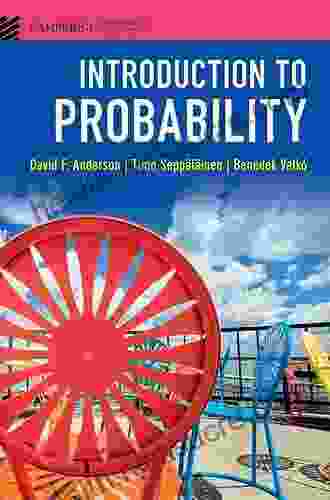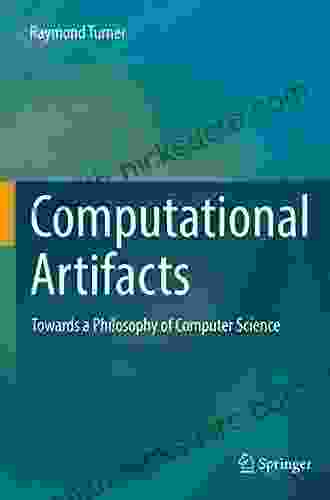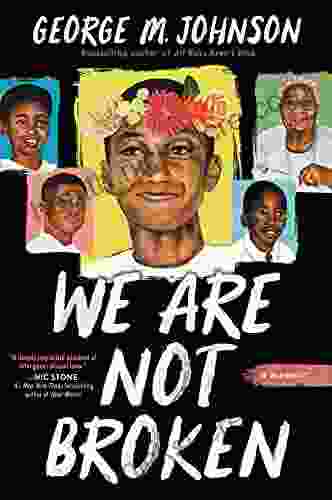Towards a Philosophy of Computer Science: Theory and Applications of Computability

Computer science is a relatively new field, but it has already had a profound impact on our world. Computers have revolutionized the way we communicate, learn, work, and play. They have also raised a number of important philosophical questions, such as:
5 out of 5
| Language | : | English |
| File size | : | 5124 KB |
| Screen Reader | : | Supported |
| X-Ray for textbooks | : | Enabled |
| Print length | : | 270 pages |
- What is the nature of computation?
- What are the limits of computation?
- What are the ethical implications of artificial intelligence?
In this article, we will explore these questions and develop a philosophical foundation for computer science. We will begin by examining the theory of computability, which provides a mathematical framework for understanding the nature of computation.
The Theory of Computability
The theory of computability was developed in the 1930s by Alan Turing and Alonzo Church. It provides a mathematical definition of computation, and it shows that there are some problems that cannot be solved by any computer. These problems are said to be undecidable.
The most famous undecidable problem is the Halting Problem. This problem asks whether a given program will eventually halt or run forever. Turing showed that there is no algorithm that can solve the Halting Problem for all programs.
The theory of computability has a number of important implications for computer science. First, it shows that there are some problems that cannot be solved by any computer. This means that we need to be careful about what we expect computers to be able to do.
Second, the theory of computability provides a foundation for the study of artificial intelligence. AI researchers are interested in developing computers that can think and learn like humans. However, the theory of computability shows that there are some things that computers will never be able to do. For example, computers will never be able to fully understand human consciousness.
Applications of Computability
The theory of computability has a number of important applications in computer science. For example, it is used to:
- Design algorithms that are guaranteed to terminate
- Prove that certain problems are undecidable
- Develop new methods for artificial intelligence
The theory of computability is a powerful tool that can be used to solve a wide range of problems in computer science. It is also a source of important philosophical insights into the nature of computation and the limits of human knowledge.
Ethical Implications of Artificial Intelligence
As AI continues to develop, it is important to consider the ethical implications of this technology. AI has the potential to do great good, but it also has the potential to be used for harmful purposes.
One of the most important ethical issues raised by AI is the issue of job displacement. As AI becomes more sophisticated, it is possible that many jobs that are currently performed by humans will be automated. This could lead to widespread unemployment and economic hardship.
Another ethical issue raised by AI is the issue of privacy. AI systems can collect and analyze vast amounts of data about our lives. This data could be used to discriminate against us, or to manipulate us into making decisions that are not in our best interests.
It is important to start thinking about the ethical implications of AI now, before it is too late. We need to develop policies and regulations that will ensure that AI is used for good and not for evil.
Computer science is a rapidly growing field with the potential to revolutionize our world. However, it is important to remember that computer science is not just about technology. It is also about philosophy. The theory of computability provides a mathematical framework for understanding the nature of computation, and it raises a number of important philosophical questions about the limits of human knowledge and the ethical implications of AI.
As computer science continues to develop, it is important to continue to explore the philosophical implications of this technology. By ng so, we can ensure that AI is used for good and not for evil.
5 out of 5
| Language | : | English |
| File size | : | 5124 KB |
| Screen Reader | : | Supported |
| X-Ray for textbooks | : | Enabled |
| Print length | : | 270 pages |
Do you want to contribute by writing guest posts on this blog?
Please contact us and send us a resume of previous articles that you have written.
 Fiction
Fiction Non Fiction
Non Fiction Romance
Romance Mystery
Mystery Thriller
Thriller SciFi
SciFi Fantasy
Fantasy Horror
Horror Biography
Biography Selfhelp
Selfhelp Business
Business History
History Classics
Classics Poetry
Poetry Childrens
Childrens Young Adult
Young Adult Educational
Educational Cooking
Cooking Travel
Travel Lifestyle
Lifestyle Spirituality
Spirituality Health
Health Fitness
Fitness Technology
Technology Science
Science Arts
Arts Crafts
Crafts DIY
DIY Gardening
Gardening Petcare
Petcare Alistair Brownlee
Alistair Brownlee Kim Heacox
Kim Heacox Beth Cavenaugh
Beth Cavenaugh Allison Tyson
Allison Tyson Allison Williams
Allison Williams Lynn Acton
Lynn Acton Daniel Stewart
Daniel Stewart Grace Lindsay
Grace Lindsay Lewis Carroll
Lewis Carroll Rebecca St James
Rebecca St James Kenji Tokitsu
Kenji Tokitsu Rene Almeling
Rene Almeling Saint Teresa Of Avila
Saint Teresa Of Avila Michele Stanten
Michele Stanten Alison Pearlman
Alison Pearlman Alisha J Brown
Alisha J Brown Chris Fox
Chris Fox Roy Macskimming
Roy Macskimming James F Mckenzie
James F Mckenzie Jacqueline H Wolf
Jacqueline H Wolf Jeremy Evans
Jeremy Evans Alivia Stephens
Alivia Stephens Allen Everett
Allen Everett Karen Bonnell
Karen Bonnell Karen Blumenthal
Karen Blumenthal Jim C Hines
Jim C Hines Roger Bannister
Roger Bannister Arianna Brooks
Arianna Brooks Vitalis I Valentine
Vitalis I Valentine Julie Schwietert
Julie Schwietert Henry Cloud
Henry Cloud Suzanne O Sullivan
Suzanne O Sullivan Barbara De Angelis
Barbara De Angelis Kristine Hudson
Kristine Hudson Y R Davis
Y R Davis Wendelin Van Draanen
Wendelin Van Draanen Paul J Kosmin
Paul J Kosmin Stuart Holmes Coleman
Stuart Holmes Coleman Jennifer Waldburger
Jennifer Waldburger Robin Stevenson
Robin Stevenson Jay Blahnik
Jay Blahnik J Richard Gott
J Richard Gott Kaitlyn Hill
Kaitlyn Hill Amy Wenzel
Amy Wenzel Julie Morgenstern
Julie Morgenstern Liz Evers
Liz Evers Jdmission Senior Consultants
Jdmission Senior Consultants Randy Russell
Randy Russell David Hurst Thomas
David Hurst Thomas Josephine Perry
Josephine Perry Eddie Guerrero
Eddie Guerrero Tom Daley
Tom Daley Itzik Ben Gan
Itzik Ben Gan Tim Baker
Tim Baker Elce Junior Lauriston
Elce Junior Lauriston Katy Milkman
Katy Milkman Paul S Auerbach
Paul S Auerbach The Dark Lords
The Dark Lords Tim Roughgarden
Tim Roughgarden Pamela Douglas
Pamela Douglas Alison Scott Wright
Alison Scott Wright Laura Randall
Laura Randall Pottermore Publishing
Pottermore Publishing Gerd Gigerenzer
Gerd Gigerenzer Alexander Clarke
Alexander Clarke John Hughes
John Hughes John Bul Dau
John Bul Dau William A Haviland
William A Haviland Kota Nozomi
Kota Nozomi Robbin Gregory
Robbin Gregory Pasco Valana
Pasco Valana Lisa M Rose
Lisa M Rose Gail Steketee
Gail Steketee The School Of Life
The School Of Life Somaiya Daud
Somaiya Daud Scott Graham
Scott Graham Bill Hendricks
Bill Hendricks Gary Sizer
Gary Sizer Jason Padgett
Jason Padgett Michelle Nijhuis
Michelle Nijhuis Mike Zimmerman
Mike Zimmerman N B Hankes
N B Hankes Kaylee Cole
Kaylee Cole Claude Levi Strauss
Claude Levi Strauss Laerke Recht
Laerke Recht Jen Torborg
Jen Torborg C S Wilde
C S Wilde Richard H Thaler
Richard H Thaler Allan House
Allan House Anna Leinberger
Anna Leinberger Natasha Devon
Natasha Devon Bruce Tremper
Bruce Tremper Segun Adebajo
Segun Adebajo Charlotte Runcie
Charlotte Runcie Allen Carr
Allen Carr Dan Abrahams
Dan Abrahams Dennis Overbye
Dennis Overbye John C Lennox
John C Lennox Kwame Onwuachi
Kwame Onwuachi Allison Schrager
Allison Schrager Jim Mancuso
Jim Mancuso Eli Saslow
Eli Saslow Iain Gately
Iain Gately Christopher Bruhn
Christopher Bruhn Amby Burfoot
Amby Burfoot Joe Vasicek
Joe Vasicek Signe Pike
Signe Pike Glenn Tinnin
Glenn Tinnin James Kipling
James Kipling Geoff Salmon
Geoff Salmon Kenneth Igiri
Kenneth Igiri Sean Patrick
Sean Patrick Peter Hollins
Peter Hollins D C Fergerson
D C Fergerson Marc Bubbs
Marc Bubbs Dan Millman
Dan Millman Kate Clifford Larson
Kate Clifford Larson Aubrey Gordon
Aubrey Gordon Jeff Gordon
Jeff Gordon Michael Reist
Michael Reist Toru Toba
Toru Toba Carrot Quinn
Carrot Quinn Sid Roth
Sid Roth Debra L Martin
Debra L Martin Eric Lemarque
Eric Lemarque Matthew Mccoy
Matthew Mccoy Susan Kuklin
Susan Kuklin Stuart A Kauffman
Stuart A Kauffman Bogdan Ivanov
Bogdan Ivanov Carlo Ancelotti
Carlo Ancelotti Brett Lee Scott
Brett Lee Scott Nick Riley
Nick Riley Susan Ware
Susan Ware Allison Alexy
Allison Alexy Gregory Cochran
Gregory Cochran Allan Kardec
Allan Kardec Alister E Mcgrath
Alister E Mcgrath Sam Jefferson
Sam Jefferson Daniel Mendelsohn
Daniel Mendelsohn Rhonda Huettenmueller
Rhonda Huettenmueller James Ferguson
James Ferguson Clive Cussler
Clive Cussler Sheena Byrom
Sheena Byrom Giuseppe Mascoli
Giuseppe Mascoli Leah Vanderveldt
Leah Vanderveldt Harald B Teicher
Harald B Teicher Eickhel Mendoza
Eickhel Mendoza Trae Dorn
Trae Dorn John Shewey
John Shewey Mary Quinlan Mcgrath
Mary Quinlan Mcgrath Stephen R Covey
Stephen R Covey Petr Zima
Petr Zima Don Miguel Ruiz
Don Miguel Ruiz George Buehler
George Buehler Danica G Hays
Danica G Hays Bill Horn
Bill Horn Rex Allen Jones Ii
Rex Allen Jones Ii Emma Shelford
Emma Shelford Chris Chambers
Chris Chambers 10th Edition Kindle Edition
10th Edition Kindle Edition Linda Martella Whitsett
Linda Martella Whitsett Alistair Higham
Alistair Higham Carla Mooney
Carla Mooney Aly Raisman
Aly Raisman Tom Kelly
Tom Kelly Allan Phillips
Allan Phillips Tami Asars
Tami Asars Chris Mulder
Chris Mulder Sarah Grison
Sarah Grison Diana Korte
Diana Korte Ryan Hall
Ryan Hall Janet E Wall
Janet E Wall Richard M Van Gaasbeek
Richard M Van Gaasbeek Jonathan E Steinhart
Jonathan E Steinhart Chris Lundgren
Chris Lundgren Karen Wambach
Karen Wambach Rob Shelsky
Rob Shelsky James Patterson
James Patterson Joe Sparrow
Joe Sparrow Phil Hornshaw
Phil Hornshaw Kate Wood
Kate Wood Mark Dice
Mark Dice Robert Taylor
Robert Taylor Mark Beauregard
Mark Beauregard Theodore B Sauselein
Theodore B Sauselein Todd Wilbur
Todd Wilbur Daniel J Siegel
Daniel J Siegel Patrick Stewart
Patrick Stewart Godfrey Higgins
Godfrey Higgins Aliza Kelly
Aliza Kelly John Novosel Jr
John Novosel Jr Casi Mclean
Casi Mclean Maurice Isserman
Maurice Isserman John Lloyd
John Lloyd Joe Kelly
Joe Kelly Frank Delaney
Frank Delaney Valerie Gilpeer
Valerie Gilpeer Bobby Clampett
Bobby Clampett Robert Kiltz
Robert Kiltz Shawn D Madden
Shawn D Madden Grant Petersen
Grant Petersen Judith Mckay
Judith Mckay Maria Rickert Hong
Maria Rickert Hong Steven J Burton
Steven J Burton Dr Nadine Sinclair
Dr Nadine Sinclair W Edwards Deming
W Edwards Deming Dennis Georgatos
Dennis Georgatos Peter Van Der Linden
Peter Van Der Linden Allen M Hornblum
Allen M Hornblum Jared Cohen
Jared Cohen P J Richards
P J Richards Marc Vachon
Marc Vachon Mandi Hickman
Mandi Hickman Mark Kistler
Mark Kistler Monique Joiner Siedlak
Monique Joiner Siedlak William W Dressler
William W Dressler Hilda Jarman Muir
Hilda Jarman Muir Linda A Curtis
Linda A Curtis Raymond Turner
Raymond Turner J R R Tolkien
J R R Tolkien Carla Simpson
Carla Simpson Norrinda Brown Hayat
Norrinda Brown Hayat Anna Costaras
Anna Costaras James Fallows
James Fallows John Michael Kelly
John Michael Kelly Emily Parke Chase
Emily Parke Chase Thomas R Verny
Thomas R Verny Tress Bowen
Tress Bowen Dan Miller
Dan Miller Allen Dulles
Allen Dulles Gavin Fairbairn
Gavin Fairbairn Allen G Taylor
Allen G Taylor Mark F Sohn
Mark F Sohn David Eagleman
David Eagleman Linda Greenlaw
Linda Greenlaw Chip Coffey
Chip Coffey W E Fairbairn
W E Fairbairn Jeff Burlingame
Jeff Burlingame Rick Johnson
Rick Johnson Lennard Bickel
Lennard Bickel Robert S Witte
Robert S Witte Cate Stillman
Cate Stillman Eric Naguski
Eric Naguski Pass Your Class
Pass Your Class Jon S Bailey
Jon S Bailey Konnie Wong
Konnie Wong Rex L Forehand
Rex L Forehand Joseph Harkreader
Joseph Harkreader Simone Milasas
Simone Milasas Greg Moran
Greg Moran Ann C Logue
Ann C Logue Alistair Cooke
Alistair Cooke George M Johnson
George M Johnson Mian Majid Ali Afzal
Mian Majid Ali Afzal Allan Trevor
Allan Trevor Vincent Schilling
Vincent Schilling Tom Babin
Tom Babin Brian Lopes
Brian Lopes Paul Green
Paul Green Winston Churchill
Winston Churchill Jack Smith
Jack Smith Suzanne Nottingham
Suzanne Nottingham Lydia Sherrer
Lydia Sherrer Ron Merly
Ron Merly Justin J Exner
Justin J Exner William B Helmreich
William B Helmreich Maria Hannay
Maria Hannay Karen Murphy
Karen Murphy Allen N Mendler
Allen N Mendler Alan Watts
Alan Watts Ashley D Kendall
Ashley D Kendall Joanna Foley Rd
Joanna Foley Rd Neil Hayes
Neil Hayes Jimena Canales
Jimena Canales Emily Thiede
Emily Thiede James Sieckmann
James Sieckmann Dr Danielle Ward
Dr Danielle Ward Rowena Murray
Rowena Murray Cinda Williams Chima
Cinda Williams Chima Meritxell Castells
Meritxell Castells Douglas Nicholas
Douglas Nicholas Robin Riley
Robin Riley Allen Stroud
Allen Stroud Molly Forbes
Molly Forbes Joe Kenn
Joe Kenn Tami Overhauser
Tami Overhauser Courtney Summers
Courtney Summers S Allen Counter
S Allen Counter Christina Hoff Sommers
Christina Hoff Sommers Eric Newby
Eric Newby Dave Pelz
Dave Pelz Allen R Angel
Allen R Angel Stephen Haddelsey
Stephen Haddelsey Nevin Martell
Nevin Martell Andrew Kastor
Andrew Kastor Robert Green
Robert Green C Calvin Jones
C Calvin Jones Jason Durham
Jason Durham Jim Downs
Jim Downs Alison Lighthall Miller
Alison Lighthall Miller Nick Karas
Nick Karas Edmund Richardson
Edmund Richardson Lsatmax Lsat Prep
Lsatmax Lsat Prep Allison Mcdonald Ace
Allison Mcdonald Ace Gary Leland
Gary Leland Marianne Williamson
Marianne Williamson Travis Jeffery
Travis Jeffery Allen O Bannon
Allen O Bannon Helen Macdonald
Helen Macdonald Jean Jacques Chevron
Jean Jacques Chevron Steve J Martin
Steve J Martin Ronald Hutton
Ronald Hutton Leonard Shlain
Leonard Shlain Franz Kellermann
Franz Kellermann Lexie Scott
Lexie Scott Catherine Gildiner
Catherine Gildiner Paul D Brinkman
Paul D Brinkman Anil Seth
Anil Seth Cy Tymony
Cy Tymony Myrna Blyth
Myrna Blyth Chris Cannon
Chris Cannon L H Nicole
L H Nicole Roy Shepard
Roy Shepard Christian Asonye
Christian Asonye Deborah Ann Davis
Deborah Ann Davis Erica Abbett
Erica Abbett Marie Osmond
Marie Osmond Matthieu Auzanneau
Matthieu Auzanneau Allan G Bluman
Allan G Bluman Jeffrey E Young
Jeffrey E Young Neely Spence Gracey
Neely Spence Gracey Brian Treanor
Brian Treanor Robert Penn Warren
Robert Penn Warren John Bargh Ph D
John Bargh Ph D Bill Varney Jr
Bill Varney Jr Suzanne Alderson
Suzanne Alderson Marlin M Mackenzie
Marlin M Mackenzie Michael Shermer
Michael Shermer Kim Liggett
Kim Liggett Pure Calisthenics
Pure Calisthenics Bret Hart
Bret Hart Alexandra Amor
Alexandra Amor Milton Gussow
Milton Gussow Carlos Castaneda
Carlos Castaneda Jim Cheney
Jim Cheney Richard Kaczynski
Richard Kaczynski Michael Fullan
Michael Fullan Grace E Stewart
Grace E Stewart Frank Christianson
Frank Christianson Linda Barrett Osborne
Linda Barrett Osborne Paul Schullery
Paul Schullery Carl Paoli
Carl Paoli Joel Thomas Chopp
Joel Thomas Chopp Chris Lear
Chris Lear John Macinnes
John Macinnes Allison Dolan
Allison Dolan Andrew Benfield
Andrew Benfield Naomi Kokoricha
Naomi Kokoricha Selene Yeager
Selene Yeager Rachel Caine
Rachel Caine Arthur Aughey
Arthur Aughey Jenara Nerenberg
Jenara Nerenberg Perry Lefko
Perry Lefko Jonathan St B T Evans
Jonathan St B T Evans Lisa Marshall
Lisa Marshall Tiger Woods
Tiger Woods Carolyn Shearlock
Carolyn Shearlock Charles Conn
Charles Conn Ian Westermann
Ian Westermann Kate Mcmahon
Kate Mcmahon Kelsey Banfield
Kelsey Banfield Brian Boone
Brian Boone Kevin West
Kevin West Deborah Macnamara Phd
Deborah Macnamara Phd Annie F Downs
Annie F Downs Debi Pearl
Debi Pearl Allison Arevalo
Allison Arevalo Nikki Solano
Nikki Solano Meredith Russo
Meredith Russo Alicia Thomas Woolf
Alicia Thomas Woolf Mary Elizabeth O Brien
Mary Elizabeth O Brien Brenda Boyd
Brenda Boyd Holly Homer
Holly Homer Alina A Von Davier
Alina A Von Davier Robert M Sapolsky
Robert M Sapolsky Charles J Robinson
Charles J Robinson Jim Rahtz
Jim Rahtz David F Anderson
David F Anderson Scott Smith
Scott Smith Ryan Spaeder
Ryan Spaeder Meredith L Jacobs
Meredith L Jacobs Edmund G R Kraal
Edmund G R Kraal Elliot Aronson
Elliot Aronson Muthukumaran Mani
Muthukumaran Mani Jonathan Moeller
Jonathan Moeller Annabeth Headrick
Annabeth Headrick Philip Gosse
Philip Gosse Daniel J Levitin
Daniel J Levitin Jorge Muniz
Jorge Muniz Andrie De Vries
Andrie De Vries Peggy L Chinn
Peggy L Chinn Joosr
Joosr Shobi Nolan
Shobi Nolan David Hancock
David Hancock Allistair Mccaw
Allistair Mccaw Liz Clark
Liz Clark Mourad Boufadene
Mourad Boufadene Frederick Mosteller
Frederick Mosteller Kathleen Bachynski
Kathleen Bachynski Susan Neiman
Susan Neiman Allen J Christenson
Allen J Christenson Matthew Syed
Matthew Syed Joseph Fort Newton
Joseph Fort Newton Ken Cohen
Ken Cohen Dr Ron M Horner
Dr Ron M Horner Marti Olsen Laney
Marti Olsen Laney Ronald E Mickens
Ronald E Mickens Bright Summaries
Bright Summaries Eugen Herrigel
Eugen Herrigel Kara Lawrence
Kara Lawrence Sabatino Moscati
Sabatino Moscati Fluent In Korean
Fluent In Korean Ethem Mining
Ethem Mining Jeff Brent
Jeff Brent Jim Bell
Jim Bell Giancarlo Lemmi
Giancarlo Lemmi Jim Cobb
Jim Cobb Matt Hart
Matt Hart Raychelle Cassada Lohmann
Raychelle Cassada Lohmann Walter Isaacson
Walter Isaacson Mara Krechevsky
Mara Krechevsky Lynn Rush
Lynn Rush Peter Mark Adams
Peter Mark Adams Linda S Jones
Linda S Jones Roy Clark
Roy Clark Etienne Noumen
Etienne Noumen Apryl Baker
Apryl Baker Kevin Leman
Kevin Leman Alison Gervais
Alison Gervais Douglas Whynott
Douglas Whynott Greg Strandberg
Greg Strandberg Priya Ardis
Priya Ardis Amy Saltzman
Amy Saltzman Mike Wallace
Mike Wallace Dr Fiona Mcpherson
Dr Fiona Mcpherson John Kavanagh
John Kavanagh Alison Aulakh
Alison Aulakh Brenda Gable
Brenda Gable Edwin Amenta
Edwin Amenta Greg Henry
Greg Henry Michaelbrent Collings
Michaelbrent Collings Bryan Goodwin
Bryan Goodwin Tom Watson
Tom Watson Despina Meris
Despina Meris Novak Djokovic
Novak Djokovic Joshua Elliot James
Joshua Elliot James Sylvia Larsen
Sylvia Larsen Jeff Hawkins
Jeff Hawkins Olajumoke Adenowo
Olajumoke Adenowo Tim Hodkinson
Tim Hodkinson Frederick Courteney Selous
Frederick Courteney Selous Judith Rich Harris
Judith Rich Harris Alicia F Lieberman
Alicia F Lieberman Felix Marks
Felix Marks Rodney Ford
Rodney Ford Maria Thompson Daviess
Maria Thompson Daviess Vivian Gornick
Vivian Gornick Allen Morris Jones
Allen Morris Jones Joel S Owen
Joel S Owen Judy Converse
Judy Converse Noor Ain
Noor Ain Jennifer E Smith
Jennifer E Smith William Stott
William Stott Ed Robinson
Ed Robinson Grant S Lipman
Grant S Lipman David M Killoran
David M Killoran Lionel Cruzille
Lionel Cruzille Sportsman S Connection
Sportsman S Connection Dennis Jarecke
Dennis Jarecke Ben Greenfield
Ben Greenfield Milt Rosko
Milt Rosko Jennifer Louden
Jennifer Louden Sarah P Morris
Sarah P Morris Stephen E Flowers
Stephen E Flowers Julie Currin
Julie Currin Allison Norfolk
Allison Norfolk Sharon Weinberger
Sharon Weinberger The Editors Of Outside Magazine
The Editors Of Outside Magazine Tim Rappleye
Tim Rappleye Victor Canning
Victor Canning Teri Moser Woo
Teri Moser Woo Mary Bergin
Mary Bergin Lynn Stafford Yilmaz
Lynn Stafford Yilmaz Allan Hall
Allan Hall Alison Palmer
Alison Palmer Randy Olson
Randy Olson Alicia Jasinska
Alicia Jasinska Don Harris
Don Harris P Schreiber
P Schreiber Kimberly Brown
Kimberly Brown
Light bulbAdvertise smarter! Our strategic ad space ensures maximum exposure. Reserve your spot today!

 Victor TurnerWaking Up On The Appalachian Trail: A Journey of Discovery and Transformation
Victor TurnerWaking Up On The Appalachian Trail: A Journey of Discovery and Transformation Cooper BellFollow ·13k
Cooper BellFollow ·13k Philip BellFollow ·3.7k
Philip BellFollow ·3.7k Maurice ParkerFollow ·4.8k
Maurice ParkerFollow ·4.8k Braden WardFollow ·4.6k
Braden WardFollow ·4.6k Hudson HayesFollow ·13.8k
Hudson HayesFollow ·13.8k Gary CoxFollow ·9.8k
Gary CoxFollow ·9.8k Danny SimmonsFollow ·18.8k
Danny SimmonsFollow ·18.8k Yasushi InoueFollow ·6.3k
Yasushi InoueFollow ·6.3k

 Dominic Simmons
Dominic SimmonsFierce Attachments: A Memoir by Vivian Gornick - A...
Vivian Gornick's Fierce Attachments is a...

 Edison Mitchell
Edison MitchellPrimer for America's Favorite Wilderness: A Comprehensive...
In the vast...

 Jan Mitchell
Jan MitchellIntroduction to Probability: A Comprehensive Guide for...
Probability is a crucial branch of...

 Chuck Mitchell
Chuck Mitchell100,000 Mile Journey Into the Heart of America
In 2016, I embarked on a...

 Eddie Bell
Eddie BellHow Schools Around the World Are Inspiring Greatness One...
Education is the key...

 Quentin Powell
Quentin PowellJourney into the Heart of Alaska: Exploring the Majestic...
Alaska, the largest...
5 out of 5
| Language | : | English |
| File size | : | 5124 KB |
| Screen Reader | : | Supported |
| X-Ray for textbooks | : | Enabled |
| Print length | : | 270 pages |










